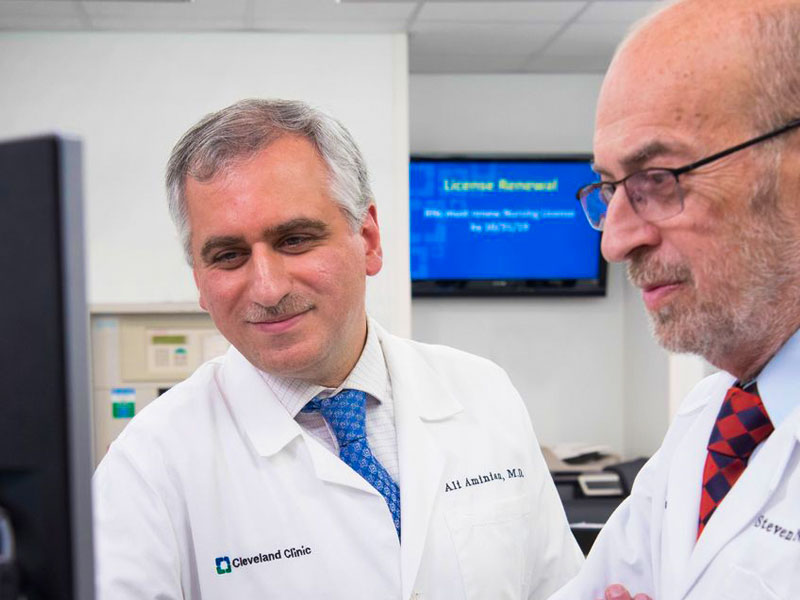With a surge in the popularity of weight loss surgery, also known as bariatric surgery, researchers have now developed an interest into finding other possible benefits of this procedure, apart from the most obvious reward — a slimmer figure.
A recent study published in The Journal of the American Medical Association (JAMA) on September 2, and at the same time presented at the annual meeting of the European Society of Cardiology, suggests that weight loss surgery can reduce the risk of heart failure, heart attack, stroke, and atrial fibrillation, as well as death rates from any cause.
The study, which was carried out by a team of researchers led by an Iranian bariatric surgery specialist and associate professor of surgery at the Cleveland Clinic, Dr. Ali Aminian, examined a large group of obese patients (13,722) with type 2 diabetes to find out the link between bariatric surgery and major adverse cardiovascular events including stroke, coronary disease, and mortality in adult patients with obesity and type 2 diabetes.
Of these patients, who are supposedly at greater risk of heart-related problems, 2,287 underwent one form of bariatric surgery. The researchers monitored the patients over a period of eight years and found out that heart events and death from any cause dropped by 39% and 41% respectively, compared to the other 11,435 matched controls who didn’t have any type of bariatric surgery.
The majority of the subjects of the study who underwent bariatric surgery had gastric bypass, in which the surgeon divides the stomach into a small upper pouch and a larger portion, attaching the small pouch directly to upper intestine, bypassing the main part of the stomach and a portion of the intestine.
After patients had their digestive system manipulated, the pattern of hormone production in their bodies changed as well, the researchers found out. They noticed that the need for insulin, which is responsible for breaking down glucose, no longer existed for many of the patients after the study period. People with diabetes have lower insulin responses to food and the study revealed that weight loss surgery seemed to restore some of the normal insulin response. The percentage of those dependent on non-insulin diabetic medications also fell from 80% to 40%.
The extent of the decline in heart events and deaths following weight loss surgery suggests that the benefits of the treatment can be more than what is attributed to the weight loss alone. “There are neurohormonal changes we see after these procedures that could have significant metabolic effects and benefits for patients,” Dr. Aminian was quoted as saying by the Time magazine.
A co-author of the paper publishing the results of the study and Charmain of cardiovascular medicine at the Cleveland Clinic, Dr. Steven Nissen also said: “As a cardiologist, I cannot remember any study, not studies involving statins, or studies involving blood pressure medication, having this large of a treatment effect.”
Bariatric surgery may also alter the composition of healthy bacteria in the stomach. Other studies have previously confirmed that diabetic patients have different species of bacteria in their digestive system compared to other people, something that can impact their bodies’ response to sugars.
Dr. Aminian did other research in his lab earlier. He has taken stool samples from patients before and after bariatric surgery and transferred them to mice as simulated human guts. Subjects receiving samples from patients prior to weight loss surgery tended to gain much weight and get diabetes and fatty liver syndrome, but these conditions were not found in those mice that received samples from patients 3 months after surgery.

The findings of these studies strongly indicate that the risk of disease and death can be reduced by addressing obesity in diabetic patients but weight loss alone may not be enough, particularly when it happens through lifestyle changes, i.e. exercise and diet.
According to Dr. Aminian, it’s not just one factor involved. While losing weight does matter, the gut hormones and the microbiome are important as well. “They all work together like an orchestra to improve the metabolic condition of the patient,” he says.
However, Dr. Aminian and Dr. Nissen agree that bariatric surgery may not be a viable option for all diabetic patients with obesity, but the data show that more people could benefit from this procedure in the future.
The American Society for Metabolic and Bariatric Surgery (ASMBS) set three main criteria for patients to be considered as good candidates for weight loss surgery, which are as follows:
1- Having a Body Mass Index (BMI) of 40 or more or over 100 pounds overweight.
2- Having a BMI of 35 or more and at least one obesity-related comorbidities, such as heart disease, high blood pressure, type 2 diabetes, respiratory disorders, osteoarthritis, non-alcoholic fatty liver disease, gastrointestinal disorders, or lipid abnormalities.
3- Having failed to achieve a healthy weight loss with previous efforts for a period of time.
Weight loss surgery is referred to as a series of different procedures that aim to help people suffering from obesity lose a large amount of weight. They work either by restricting the amount of food intake, such as sleeve gastrectomy, or altering the way the digestive system absorbs food, such as gastric bypass, which is both restrictive and malabsorptive.
It is noteworthy that Dr. Aminian served as Assistant Professor of Surgery at Tehran Medical University for six years before joining the Cleveland Clinic. He received the prestigious Society for Metabolic and Bariatric Surgery (ASMBS) Young Investigator Award in 2013.
By Ebrahim Mousavi
2121


